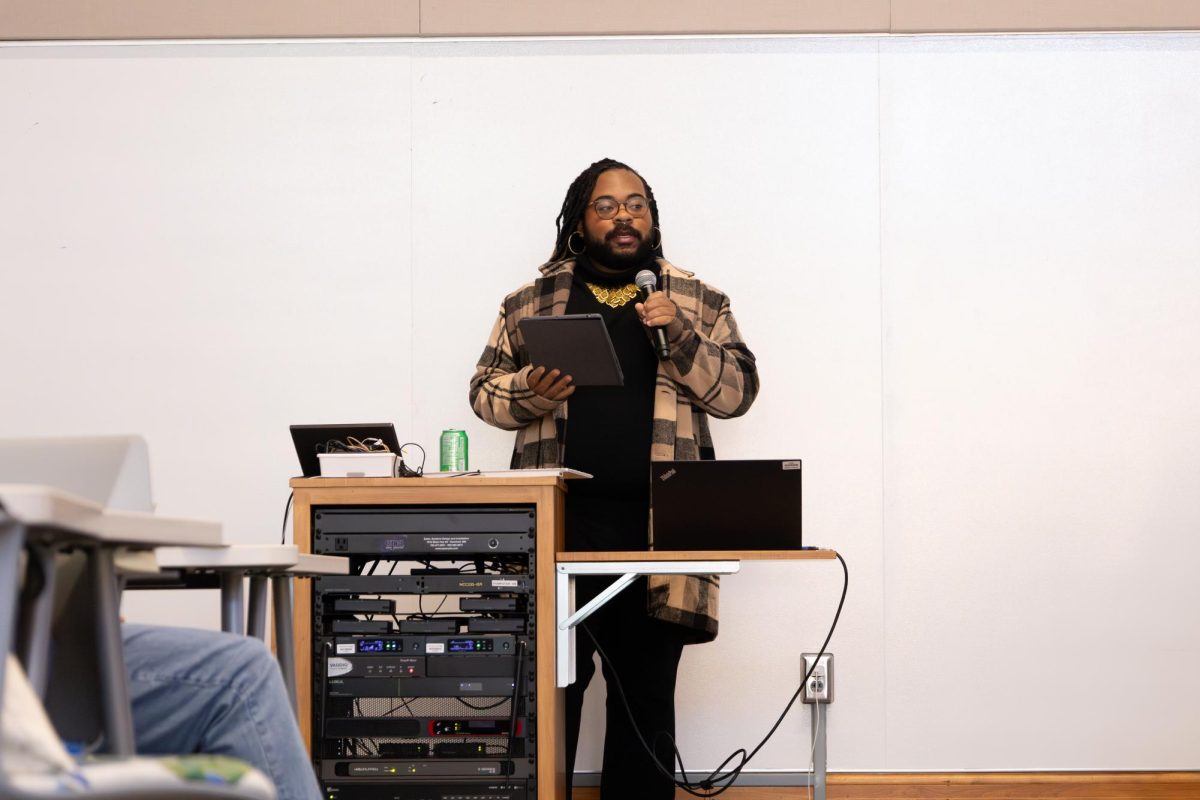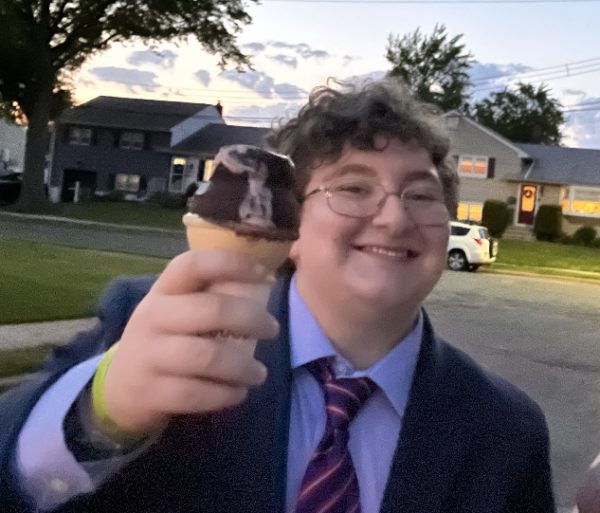On Thursday, Feb. 15, students, staff and community members gathered in the Chapel during common time to settle an important debate: which is better, latkes or hamantaschen?
As Jewish Students of Carleton (JSC) President Becky Reinhold ’25 explained, both latkes and hamantaschen are popular Jewish foods eaten during holidays. (Reinhold is also the Editor-in-Chief of the Carletonian). Latkes are savory fried pancakes made of potato, onions, eggs and other binding agents like potato starch and matzo meal. They are often topped with applesauce or sour cream on Chanukah, and are deep-fried in oil to commemorate the “miracle of light,” in which an oil lamp in the holy temple burned for eight nights with only a one-day supply of fuel. Hamentaschen, on the other hand, are sweet, triangle shaped cookies that can be filled with poppy seeds, fruit jam or even chocolate (a nontraditional flavor). This dessert is eaten during the holiday of Purim in commemoration of the defeat of the evil Haman, who tried to kill the Jewish population in Persia and allegedly wore a three-pointed hat.
This debate has happened several times in the past, and in earlier years there were multiple professors on each team. Reinhold told a (made-up) history of this event with a folkloric tone, saying “Once upon a time in a faraway place, the JSC decided to host a food event…so [to decide which foods to include] they set out to consult a wide array of sources — they consulted textbooks and notebooks, but to no avail, so they turned to their professors…[and] in the interest of promoting intellectual discourse, they decided to host a debate.”
This year, there was one professor on each side. On the side of the latke was Benedict Distinguished Visiting Professor of Religion Laura Levitt, originally from Temple University. Professor Ethan Struby, an assistant professor of economics, defended hamantaschen for the second time while donning his faculty regalia from Boston College.
The event was split into three parts. First, each side gave a 10 minute PowerPoint presentation defending their preferred food. Then, Levitt and Struby each had five minutes to rebut the other’s points. Finally, they opened up to the audience to question both debaters.
After a coin flip to determine the presentation order, Levitt spoke first, focusing on three main points. Her first argument was that latkes were superior to hamantaschen because they are more filling and nutritious. Despite her background in the humanities, Levitt turned to a scientific study that found potatoes to be the most satiating food compared to equally sized portions of other foods.
“The potato is one of the most nutritious and satiating foods on the planet, ” Levitt said. “If you are starving, what do you want to eat? Do you want a sugary confection or do you want a potato?” She claimed that potatoes, with their nutritional value, keep people alive, while the sugar in hamantaschen contributes to health problems.
Her second argument, in tune with her background in religion and her experience in the Jewish tradition, concerned the biblical evidence for the superiority of the potato. She spoke about holy things being of the order of creation, and how potatoes belong to this category as they are fruits of the ground. She also claimed that the potato, based on the orientation of its growth in the ground, is masculine and dominant. She admits, “It’s a bit of a sexist argument, but I have to go there in order to defend the potato”.
After a “potato interlude,” which consisted of a compilation of latke photos, Levitt began to discuss the concepts of “form” and “matter” when it comes to existence. In theory, form trumps matter, and the potato refuses to be ruled by matter, making it superior. Her theoretical argument also dismantled her earlier argument that the potato is masculine, now calling the potato feminine, which resulted in cheers.
To close her presentation, Levitt led the crowd in a singing of “I am a Latke” by Debbie Friedman, a well-known Jewish musician. “The latke is supreme in my mind,” Levitt concluded.
Struby then started to present, and he began by conceding that while he is participating in this debate and has done so in the past, he is not Jewish. He refuted this point by saying that while he isn’t Jewish, he is “an economist, and economists have a history of talking about things they have no business talking about.” Struby, like Levitt, divided his speech into several main arguments, with his presentation containing five points.
His first argument was based on a choice-theoretical model. He made the assumption that 1) people have the choice between latkes and hamantaschen and 2) people choose hamantaschen, thus hamantaschen is better. He called this argument “I assume I win, therefore I win.”
Struby continued to his second point, intertemporal choice (another principle of economics). He explained that people want to eat more hamantaschen today and more hamantaschen tomorrow, and the phenomenon that is often studied in economics is what the balance between “more today” and “more tomorrow” is. Whatever this balance is, Struby concludes, hamantaschen have the upper hand, because they are shelf-stable and latkes are not as they have to be eaten hot.
After this explanation, Struby used the concept of deadweight loss to prove his point. Deadweight loss is the difference between the supply and demand amount when the market isn’t in perfect competition. When graphed, it creates a triangle shape. Because hamantaschen are triangles, Struby claimed that this proves their superiority.
His fourth point concerned the uniqueness of both the latke and hamantaschen. According to Struby, there are a plethora of latke-like potato dishes, while the hamantaschen stands alone in its triangle-shaped confectionery status. Therefore, hamantaschen makers can get away with higher markups on their products, and thus make more money. This allows the bakers to “get that paper,” said Struby.
Struby’s last point concerned some anthropological-economic literature about the connection between staple crops and the “complexity of civilizations.” Through this research, Struby noted that in areas of the world in which the staple crop is cereal grains, societies are much more complex. This is because grains are easy to steal and require complex storage to contain them, which is not the case for areas in which the potato is dominant. Since hamantaschen are made of flour, this proves their superiority as a food.
After Struby’s presentation, both participants were given five minutes for rebuttal. Levitt went first, beginning with a feminist argument. She claimed that “only white guys back hamantaschen,” citing the several Jewish economists that Struby drew on in his speech. She also appealed to diversity and cast aside Struby’s arguments in the name of denouncing capitalism. To his choice-theoretical argument, she said that Struby assuming he wins doesn’t make it so. Refuting his deadweight loss argument, Levitt said “If you eat a lot of hamantaschen, that’s a lot of dead weight.” She conceded that she does love graphs, but insisted they didn’t matter, because “when things get bad, the potato is there.” She concluded her rebuttal by emphasizing the conclusion to her presentation, saying “and we’ve got a SONG.”
Struby’s rebuttal began with the claim that most of Levitt’s arguments were invalid because they spoke about the superiority of potatoes, but as he said, “we’re talking about latkes here.” He then refuted Levitt’s anti-sugar argument, saying that “sugar may or may not be bad, but sugar kicks ass,” and he knows that trans fats, which are present in the deep-fried latke, are definitely bad for one’s health.
He didn’t go after all of Levitt’s points, admitting he is “not even going to touch the biblical stuff.” Struby responded to Levitt’s gender argument, first by saying: “the argument that men are terrible [is one] which I will gladly concede.” He continued, saying that hamantaschen having three sides works in his favor, because three points rather than two breaks the gender binary. He dismantled Levitt’s argument dismissing hamentaschen in favor of resistance to capitalism, claiming that Marx’s theory of labor would make hamantaschen even more valuable than latkes because they take more labor to produce.
Levitt and Struby then had the opportunity to make closing arguments. Struby declined to participate, but Levitt reiterated her point about “The Latke Song,” saying that she would “prefer Debbie Friedman to Milton Friedman”, and asked “what Nobel prize laureate has sung a song for his supper?”
JSC treasurer Bax Meyer ’25, who moderated the debate, then allowed for audience questions. (Meyer is the Managing Director of the Carletonian). One student asked: “Since sugar grows higher than potatoes, does that make it, and thus hamantaschen, better?” Levitt answered this question, claiming that sugar is not good for human health and does not satiate, thus sugar is not better than potatoes, so hamantaschen are not better than latkes.
The next questioner asked Struby: “Hamantaschen are for civilization, but doesn’t civilization cause all of the world’s problems?” Struby responded: “your opportunity to be alive is because of civilization,” thus, the existence of problems in civilization cannot be counted against hamantaschen.
Meyer then conducted a vote by voice and show of hands. Latkes won a decisive victory. Throughout the event, attendants were served latkes and hamantaschen in the rear vestibule of the chapel.
The event was well-attended and many had an enjoyable experience. “Both professors made great arguments,” said Sophie Stein ’26, a chaplain’s associate. “I came in firmly team latke and I’m leaving firmly team latke, I just think it is the superior food and I also think any argument that has the backing of Debbie Friedman is better than an argument with no backing from Debbie Friedman, let alone backing from Milton Friedman. It’s hardly a comparison, just as comparing latkes to hamantaschen is barely a comparison.”











